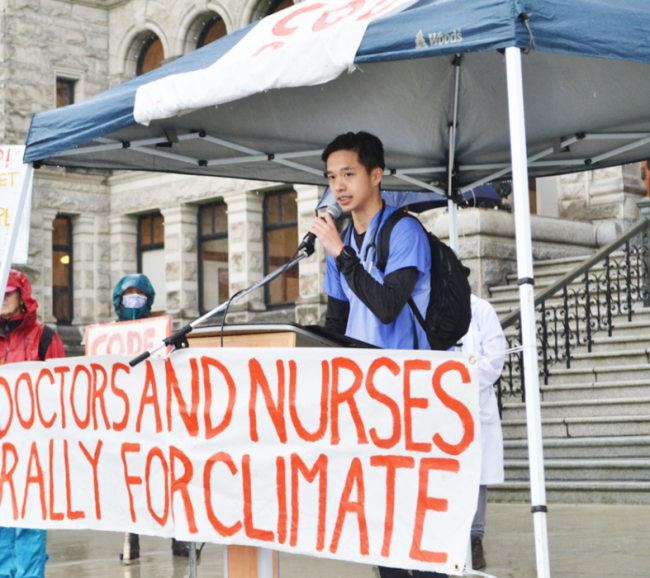Articles Menu

Jan. 9, 2023
These in-their-own-words pieces are told to Patricia Lane and co-edited with input from the interviewee for the purpose of brevity.
Dr. Kevin Liang wants health care to contribute to a healthier planet.
This 28-year-old family doctor divides his time between his practice at a community clinic in Vancouver’s Eastside and reducing health-care’s greenhouse gas emissions.

Tell us about your work.
My patients have a harder time breathing when the air is filled with wildfire smoke. They suffer negative health impacts when they cannot go outside because it is too hot, and the stress of anticipated worsening climate impacts undermines their well-being. And yet our health-care system contributes four per cent of heat-trapping gases.
I spend about two-thirds of my time on direct patient care. The rest I spend trying to prevent illness by reducing the negative health impacts of the system they rely on to make them healthier.
Applicants for medical school used to have to travel to be interviewed in person. I personally flew 12 times that year, while 2,900 other people took multiple trips. When the pandemic arrived, interviews moved to Zoom. I helped lead a campaign to keep them that way, meaning the process of entering medical school has decreased its emissions by no less than 4,240 tonnes of carbon dioxide each year.
The asthma inhalers commonly prescribed in Canada emit potent greenhouse gases called hydrofluorocarbons (HFCs). Sweden and other European countries use inhalers that emit far fewer carbons and are equally effective. I am working with other medical researchers to change prescribing guidelines to take this evidence into account.
Medical and academic researchers often travel more than they need. Many professional societies situate their conferences in attractive tourist destinations, but the pandemic has shown knowledge-exchange can be done virtually.
Dr. Kevin Liang is a family physician practising in Vancouver. This 28-year-old is passionate about planetary health and tackling health-care's carbon footprint. #YouthClimateAction #Health - Twitter
Peer-review processes sometimes require academics to travel when a virtual meeting would serve. I am part of a group called Meeting Wisely, which is supporting academics in general and health researchers in particular to measure their existing travel carbon footprint and ask if it can be more equitably allocated so young researchers are able to advance their careers.
Outside the health system, I am in leadership with the Canadian Association of Physicians for the Environment’s campaign calling for a moratorium on fracked gas. More than 1,700 studies, articles and reports show that fracking is associated with a host of health problems, including birth defects, cancer and asthma. It is no wonder that fracking is banned in several countries (including France, Germany and the U.K.) and provinces (Quebec and New Brunswick).
Additionally, burning it as cooking fuel in our homes endangers our health and extraction and burning in our fireplaces, water heaters, dryers and furnaces contribute significantly to rising emissions. In 2015, following an extensive review of the science, Health Canada issued new indoor NO2 safe exposure limits, but most existing Canadian gas ranges do not meet its long-term NO2 exposure standard.

How did you come to be involved in contending with climate change?
Climate change is the most important threat to all of our health. If there are things we can do to prevent illness and harm, as a doctor, of course, I want to see that happen.
But focusing on prevention is always more challenging in our culture. It is hard to see the present-day suffering knowing it is going to get so much worse while decision-makers are so slow to act.
What do you see if we get this right?
When I think about the incredible advances in health care even since I was in medical school, I am hopeful. Improvements in treating infectious diseases, improving heart health, and so much else in each case concerned only a subset of the population. Climate change affects all of us. If we apply our deep understanding of the importance of doing things differently to benefit patients, everyone can thrive.
Tell us about your background
I came here with my family from Taiwan when I was nine and grew up in Delta, B.C. Like so many immigrant families, we had an ethic of care. It seemed natural to me to extend that to the more than human world around me and I loved participating in creek cleanups, building rain gardens and watershed protection work. I have never seen the environment around me as entirely separate from my own well-being.

What would you like to say to other young people?
There is a lot more to be done than any one of us can individually accomplish, but that doesn't mean we shouldn’t start. We need to be patient and take care of ourselves and each other. I take care of my mind and body with regular running. It's a marathon.
What about older readers?
If you work busy weeks, engaging in climate action may seem challenging, but if we do adjust, the future can be incredibly bright. Start by including climate action as part of your work. If you are a doctor, prescribe time in parks for your patients’ well-being and focus on tasks to decrease health-care’s climate impact. If you are a researcher, consider ways to meet virtually.